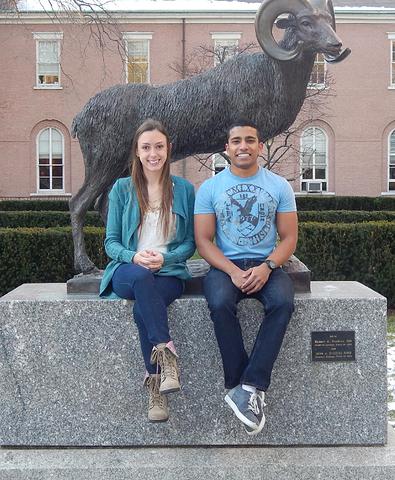By The Editorial Board
United Student Government (USG) elections are Thursday, April 10 and Friday, April 11. USG is here to represent the students and be an important liaison between the student body and the administration. Choosing USG board members is an important responsibility and we hope that all members of Rose Hill will choose to vote and take their votes seriously. Students can vote through orgsync.
We, the editorial board of The Fordham Ram, endorse Nevin Kulangara and Sarah Skrobala for the USG executive ticket. As members of the student body, we want leaders with a specific vision in mind, who can hit the ground running and help United Student Government continue its growth. After meeting with both of the tickets, we believe that Kulangara and Skrobala clearly exemplify these attributes.

The team is basing the specifics of its platform on three overarching goals: reconnecting with the student body, turning USG into an initiative-driven think tank and becoming more transparent to give students clear access to information they need. We believe that these overarching goals represent exactly the sort of direction USG should be heading. USG has done a lot to improve the visibility of student government on campus and Kulangara and Skrobala seem poised to continue that tradition.
To address the need to reconnect with the student body, Kulangara and Skrobala hope to use their experiences in the Gabelli School of Business and Fordham College Rose Hill, respectively, to unite the colleges. One way is to continue to develop Fordham Student Holdings (FSH), an umbrella organization that would allow students, regardless of their school, to create their own businesses through the university. Right now, only a few schools around the country, such as Northwestern and Georgetown, have a program comparable to FSH. Kulangara and Skrobala hope that this can help raise the prestige of the entire university. In addition, the team wants to launch an online suggestion box to make sure student concerns are heard. Kulangara hopes it can be used as a forum where students can rank their concerns in order of importance. Kulangara and Skrobala also want to encourage students to engage with their community and actually explore the Bronx; they hope to put together a virtual guide to the Bronx and really exemplify how New York is our campus.
As for turning USG into more of a think-tank, Kulangara says that he plans to shift USG from an organization caught up in insider politics and constant restructuring to one that is focused on addressing actual student concerns. Kulangara specifically mentioned the fact that USG meetings without any updates from the Senate and the executive board, which have happened on multiple occasions this year, are unacceptable.
Kulangara and Skrobala have some concrete plans to increase transparency. Their plan to create a realistic free speech formal appeals process, for example, demonstrates their desire to increase transparency and tackle some of the main issues within the student population.
They also plan to clearly define what it means to be a referendum versus a non-referendum club. They believe some clubs who have previously established a need for a set budget in consecutive semesters should be granted referendum status. Kulangara and Skrobala hope this will help address some of the issues students face with the complicated budget process.
We believe the mix of their specific and realistic goals, combined with their experience will be able to successfully address student concerns and reach a large body of people. We believe their desire to reach out to students starting from freshman orientation as well as their desire to make USG as accessible as possible will benefit the student population, if they are elected.







































































































































































































